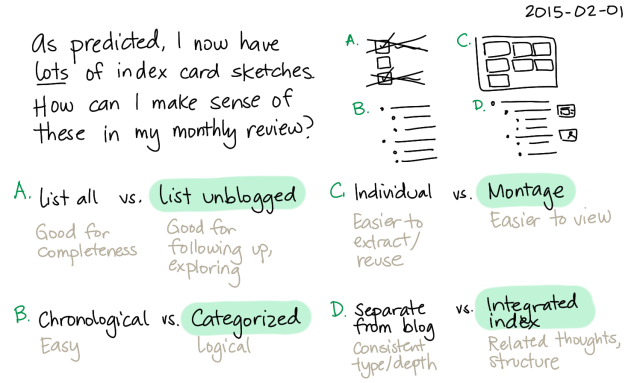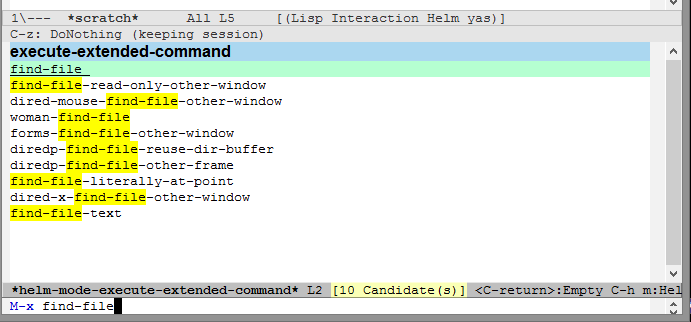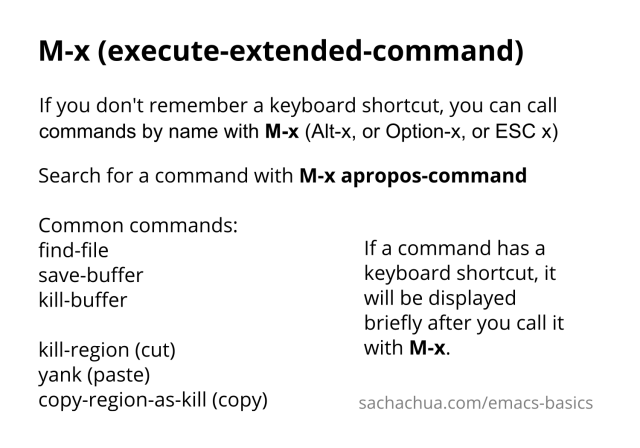Getting Helm and org-refile to clock in or create tasks
Posted: - Modified: | emacs, orgI've been thinking about how to improve the way that I navigate to, clock in, and create tasks in Org Mode. If the task is one of the ones I've planned for today, I use my Org agenda. If I know that the task exists, I use C-u C-c C-w (org-refile) to jump to it, and then ! (one of my org-speed-commands-user options) to clock in and track it on Quantified Awesome. If I want to resume an interrupted task, I use C-u C-c j (my shortcut for org-clock-goto). For new tasks, I go to the appropriate project entry and create it, although I really should be using org-capture instead.
I thought about how I can reduce some of these distinctions. For example, what if it didn't matter whether or not a task already exists? I can modify the org-refile interface to make it easier for me to create tasks if my description doesn't match anything. To make things simpler, I'll just reuse one of my org-capture-templates, and I'll pre-fill it with the candidate from Helm.
(ert-deftest sacha/org-capture-prefill-template () (should ;; It should fill things in one field at a time (string= (sacha/org-capture-prefill-template "* TODO %^{Task}\nSCHEDULED: %^t\n:PROPERTIES:\n:Effort: %^{effort|1:00|0:05|0:15|0:30|2:00|4:00}\n:END:\n%?\n" "Hello World") "* TODO Hello World\nSCHEDULED: %^t\n:PROPERTIES:\n:Effort: %^{effort|1:00|0:05|0:15|0:30|2:00|4:00}\n:END:\n%?\n" )) (should (string= (sacha/org-capture-prefill-template "* TODO %^{Task}\nSCHEDULED: %^t\n:PROPERTIES:\n:Effort: %^{effort|1:00|0:05|0:15|0:30|2:00|4:00}\n:END:\n%?\n" "Hello World" "<2015-01-01>") "* TODO Hello World\nSCHEDULED: <2015-01-01>\n:PROPERTIES:\n:Effort: %^{effort|1:00|0:05|0:15|0:30|2:00|4:00}\n:END:\n%?\n")) (should (string= (sacha/org-capture-prefill-template "* TODO %^{Task}\nSCHEDULED: %^t\n:PROPERTIES:\n:Effort: %^{effort|1:00|0:05|0:15|0:30|2:00|4:00}\n:END:\n%?\n" "Hello World" "<2015-01-01>" "0:05") "* TODO Hello World\nSCHEDULED: <2015-01-01>\n:PROPERTIES:\n:Effort: 0:05\n:END:\n%?\n"))) (defun sacha/org-capture-prefill-template (template &rest values) "Pre-fill TEMPLATE with VALUES." (setq template (or template (org-capture-get :template))) (with-temp-buffer (insert template) (goto-char (point-min)) (while (re-search-forward (concat "%\\(" "\\[\\(.+\\)\\]\\|" "<\\([^>\n]+\\)>\\|" "\\([tTuUaliAcxkKInfF]\\)\\|" "\\(:[-a-zA-Z]+\\)\\|" "\\^\\({\\([^}]*\\)}\\)" "?\\([gGtTuUCLp]\\)?\\|" "%\\\\\\([1-9][0-9]*\\)" "\\)") nil t) (if (car values) (replace-match (car values) nil t)) (setq values (cdr values))) (buffer-string))) (defun sacha/helm-org-create-task (candidate) (let ((entry (org-capture-select-template "T"))) (org-capture-set-plist entry) (org-capture-get-template) (org-capture-set-target-location) (condition-case error (progn (org-capture-put :template (org-capture-fill-template (sacha/org-capture-prefill-template (org-capture-get :template) candidate))) (org-capture-place-template (equal (car (org-capture-get :target)) 'function))) ((error quit) (if (get-buffer "*Capture*") (kill-buffer "*Capture*")) (error "Capture abort: %s" error)))) t)
Next, I want to add this to the way that Helm prompts me to refile. That means that my creation task should return something ready for org-refile. Actually, maybe I don't have to do that if I know I'm always going to call it when I want to jump to something. I might as well add that bit of code that sets up clocking in, too.
(defvar sacha/helm-org-refile-locations nil) (defun sacha/helm-org-clock-in-and-track-from-refile (candidate) (let ((location (org-refile--get-location candidate sacha/helm-org-refile-locations))) (save-window-excursion (org-refile 4 nil location) (sacha/org-clock-in-and-track) t))) (defun sacha/helm-org-refile-read-location (tbl) (setq sacha/helm-org-refile-locations tbl) (helm (list (helm-build-sync-source "Refile targets" :candidates (mapcar 'car tbl) :action '(("Select" . identity) ("Clock in and track" . sacha/helm-org-clock-in-and-track-from-refile)) :history 'org-refile-history) (helm-build-dummy-source "Create task" :action (helm-make-actions "Create task" 'sacha/helm-org-create-task))))) (defun sacha/org-refile-get-location (&optional prompt default-buffer new-nodes no-exclude) "Prompt the user for a refile location, using PROMPT. PROMPT should not be suffixed with a colon and a space, because this function appends the default value from `org-refile-history' automatically, if that is not empty. When NO-EXCLUDE is set, do not exclude headlines in the current subtree, this is used for the GOTO interface." (let ((org-refile-targets org-refile-targets) (org-refile-use-outline-path org-refile-use-outline-path) excluded-entries) (when (and (derived-mode-p 'org-mode) (not org-refile-use-cache) (not no-exclude)) (org-map-tree (lambda() (setq excluded-entries (append excluded-entries (list (org-get-heading t t))))))) (setq org-refile-target-table (org-refile-get-targets default-buffer excluded-entries))) (unless org-refile-target-table (user-error "No refile targets")) (let* ((cbuf (current-buffer)) (partial-completion-mode nil) (cfn (buffer-file-name (buffer-base-buffer cbuf))) (cfunc (if (and org-refile-use-outline-path org-outline-path-complete-in-steps) 'org-olpath-completing-read 'org-icompleting-read)) (extra (if org-refile-use-outline-path "/" "")) (cbnex (concat (buffer-name) extra)) (filename (and cfn (expand-file-name cfn))) (tbl (mapcar (lambda (x) (if (and (not (member org-refile-use-outline-path '(file full-file-path))) (not (equal filename (nth 1 x)))) (cons (concat (car x) extra " (" (file-name-nondirectory (nth 1 x)) ")") (cdr x)) (cons (concat (car x) extra) (cdr x)))) org-refile-target-table)) (completion-ignore-case t) cdef (prompt (concat prompt (or (and (car org-refile-history) (concat " (default " (car org-refile-history) ")")) (and (assoc cbnex tbl) (setq cdef cbnex) (concat " (default " cbnex ")"))) ": ")) pa answ parent-target child parent old-hist) (setq old-hist org-refile-history) ;; Use Helm's sources instead (setq answ (sacha/helm-org-refile-read-location tbl)) (if (and (stringp answ) (setq pa (org-refile--get-location answ tbl))) (progn (org-refile-check-position pa) (when (or (not org-refile-history) (not (eq old-hist org-refile-history)) (not (equal (car pa) (car org-refile-history)))) (setq org-refile-history (cons (car pa) (if (assoc (car org-refile-history) tbl) org-refile-history (cdr org-refile-history)))) (if (equal (car org-refile-history) (nth 1 org-refile-history)) (pop org-refile-history))) pa) (if (and (stringp answ) (string-match "\\`\\(.*\\)/\\([^/]+\\)\\'" answ)) (progn (setq parent (match-string 1 answ) child (match-string 2 answ)) (setq parent-target (org-refile--get-location parent tbl)) (when (and parent-target (or (eq new-nodes t) (and (eq new-nodes 'confirm) (y-or-n-p (format "Create new node \"%s\"? " child))))) (org-refile-new-child parent-target child))) (if (not (equal answ t)) (user-error "Invalid target location")))))) (fset 'org-refile-get-location 'sacha/org-refile-get-location)
Hooray! Now C-u C-c C-w (org-refile) also lets me use TAB or F2 to select the alternative action of quickly clocking in on a task. Mwahaha.
You can check out this code in my config to see if anything has been updated. Want to learn more about modifying Helm? Check out these posts by John Kitchin and Rubikitch.
I think I'm getting the hang of tweaking Helm. Yay!







